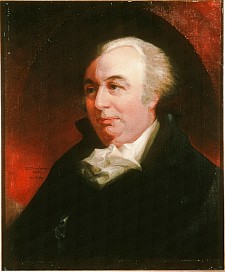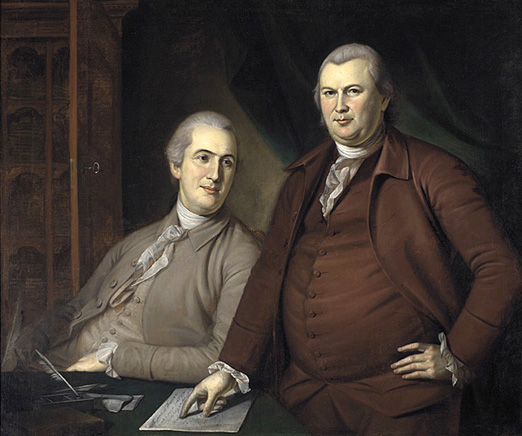
Gouverneur Morris, American Founding Father and “Penman of the Constitution”, was apart of the committee that drafted the U.S. Constitution. That was not all though, Morris also worked as a well known lawyer, served in the Continental Congress, and signed the Articles of Confederation.
In New York City on January 31, 1752, Gouverneur Morris, named for his mother’s surname, was born to parents Lewis Morris, Jr. and Sarah Gouverneur. He came from a prominent wealthy New York family. At a young age he badly wounded his leg to accident in a carriage and at twelve years old he applied and was accepted into King’s College (now known as Columbia University). Morris graduated from school in 1768. Then, three years later he got his Master’s degree and was entered into the bar in 1775 after studying law.
The same year he was entered into the bar, Morris was elected to and attended the New York Provincial Congress in May, representing his home in Westchester County (Bronx County). Morris worked hard with his colleagues to turn New York into an independent state rather than a colony under British rule. As Morris continued to fight for his colony’s freedom, he had a falling out with his loyalist family and former mentor William Smith. From 1777 to 1778, Morris also served in the New York State Assembly.
After serving in the New York State Assembly, Morris was appointed as a delegate to take part in the Continental Congress. On January 28, 1778 he attended Congress for the first time. Quickly, George Washington chose Morris to work with him in coordinating reforms of the military. Morris became the Continental Army spokesman in Congress after being in Valley Forge and realizing how bad the living conditions were for the army. In 1778 Morris also signed the Articles of the Confederation while he continued to help the army through Congress. The same year, Morris was the tie-breaker on the vote of whether or not George Washington should keep his command as Commander in Chief of the army. he voted in favor of George Washington keeping his position.
Morris had served in the Continental Army for only a year when he was defeated for reelection. So, Morris left his home in New York and moved to Philadelphia, Pennsylvania. While there, he went back to working in law and as a merchant. His left leg was amputated in 1780 and he had to use a wooden pegleg. At a young age he had wounded it but there were rumors that he had injured it while running from a husband of a woman he was having an affair with.

For some time after moving to Philadelphia, Morris worked for a merchant named Robert Morris. Despite having the same surname, they were not related. Both Robert Morris and George Washington had recommended Gouverneur Morris for the Constitutional Convention. In 1787, Morris served as a delegate from Philadelphia at the Constitutional Constitution after working for a few years as the assistant superintendent of finance from 1781-85.
During the convention, Morris was elected for the committee of five men who drafted the constitution. An American author well known for her biographies, Catherine Drinker Bowen, had referred to Morris as the “amanuensis” of the five. In other words, he was the one to primarily write and polish the document on paper. This earned Morris the nickname “Penman of the Constitution.” Morris was a firm believer in aristocracy and only landowners should be permitted to vote. He also believed that they should not add any western states to their new country. However, he was in the minority for both of these beliefs. Morris gave many speeches while attending the convention, 173 to be exact and more than any other delegate and spoke out against slavery.
From 1792-94, Morris was the Minister Plenipotentiary France after spending some time in the country for business in 1789. He was notably sympathetic to Marie Antoinette and wrote of her often in his diaries. In 1798, Morris came back to the United States and served in the United States Senate as a federalist. On May 3, 1800 he had been elected but defeated for reelection and lost his seat on March 3, 1803.
Morris married Anne Cary “Nancy” Randolph in 1809 at the age of fifty-seven. Nancy was over twenty years his junior and was thirty-five at the time of marriage. Before their marriage, Nancy had been accused of murdering a newborn baby along with Richard Randolph, her sister’s husband. Nancy was also said to be having an affair with him. Richard died in 1796 and she later went to work as a housekeeper for Morris. The couple had a happy marriage with one son, Gouverneur Morris Jr. (February 9, 1813-August 20, 1888). Nancy died in 1837.
After losing his Senate seat, Morris went on to be an honorary member of the New York Society of Cincinnati in 1803 then the Chairman of the Erie Canal Commission in 1810 to 1813. In 1814, he was elected to the American Antiquarian Society.
On November 6, 1816, Gouverneur Morris died at Morrisania, his family’s estate, after become infected while using a whale bone to try getting rid of a blockage in his urinary tract. Morris was sixty-four years old at the time of his death.